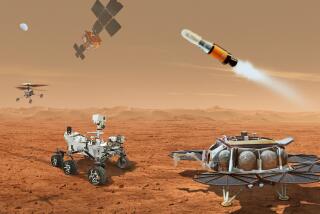Mir’s 13-Year Orbit Looks to Be Ending
- Share via
MOSCOW — There was a time when Konstantin Feoktistov didn’t ask why. The cosmos was out there waiting, and he knew how to get there.
But now, the 73-year-old engineer and former cosmonaut, who was the brains and the force behind Russia’s Mir space station, is troubled. He’s no longer quite sure what the point was.
“We got what we planned from the Mir,” he said. “But we never got all we hoped.”
For the last 13 years, Russia has achieved something unprecedented in human history--it kept man continually in orbit around the Earth.
The Mir space station, for all its travails, remains the world’s longest-running space mission.
On Saturday, Mir’s 13th anniversary, a three-man crew widely expected to be the station’s last blasted off from Russia’s Baikonur space center in Kazakhstan.
If all goes as expected, two members of this new team will remain on Mir until Aug. 23 along with one of the current crew. And then they will close the hatch for the last time, head back to Earth and leave the space station to burn up in the atmosphere.
Russian space officials insist that Mir’s fate is not yet sealed. Private donors may yet be found to keep it running, they say. But as the situation stands now, the program will not be able to continue past August.
“This would be a somber event,” space agency spokesman Vladimir Solovev said Saturday.
Indeed, many Russians will take Mir’s demise hard.
Through the last seven years of economic and political collapse, despite a near-fatal collision and sundry other glitches, Mir has remained a tangible and powerful sign of Russian scientific prowess.
But a costly one. Money is what is finally forcing the Russians to scrap the space station. And it is money that now gives Feoktistov pause.
“The technical achievements we made in space are successes for engineers,” he said in an interview. “But it’s not an achievement for taxpayers, who paid their money, for us engineers to play around with our gadgets and enjoy ourselves.”
Feoktistov is a slight man with shiny white hair and with worry lines under his eyes. He fears that in the case of the international space station, known as Alpha, which is now under construction, once again engineers are building fancy machines without stopping to ask why.
“We never exactly knew what fish we were trying to catch,” he said. “And that’s why we didn’t know what kind of net to use. When we started to focus our research on Mir, it was because we thought we needed a bigger net. But space turned out to be too big for a net of any size.
“I used to believe in the big-net principle,” he continued. “Not anymore. The Alpha station is just a repetition of what we did, on a larger scale.”
Feoktistov’s views are not shared by either the Russian Space Agency or NASA.
Russian space officials rattle off Mir’s achievements: more than 16,500 experiments, 600 new technologies, 100 astronauts and cosmonauts. At 16 orbits a day over 13 years, Mir has passed around the Earth nearly 76,000 times. Space Agency Director Yuri N. Koptev said it could keep flying another two or three years.
But Koptev acknowledged that the government does not have the $250 million it costs each year to operate the station. And his hopes that a private investor would foot the bill have turned out to be “wishful thinking.”
For its part, NASA has long considered Mir to be a drain on the Russian space program, sucking up financial resources needed to build the international space station.
Russia has fallen more than a year behind schedule on the new station project, and space officials have acknowledged that the next module may be another three months late, going up in September instead of June.
“They can’t afford to operate two stations at the same time,” said John Pike, director of space policy at the Federation of American Scientists. “For the last five years, Mir has been a test bed for the new station. That’s the only thing that has kept it in orbit this long.”
Moreover, Pike argued, Russians need to learn to stop being competitive with the United States, especially when it comes to space. These days, it is time to refine the symbolism of a national space program.
“Do they want their space program to symbolize that they have joined the post-Soviet collection of democracies and are working in cooperation with them?” he asked. “Or do they want to go it alone and try to show that they are different from everybody else?
“That hasn’t worked too well in the past,” he said.
Koptev, meanwhile, said he’s ready for a new era of space cooperation.
“If we want to continue to consider ourselves an advanced nation and one of the world’s developed, civilized powers,” the space agency director said recently, “then it would be silly not to take part in building the international space station.”
Pike said he hopes the Russians can bring themselves to let Mir go. It’s time to end the space race once and for all, he said, adding that even though the international space station will be expensive, he considers its political value priceless.
“There are so many things going wrong between our two countries right now,” he said. “We’re at loggerheads on nearly every other issue except space. If it costs a couple of billion dollars a year to remind us that we’re not enemies, it’s well worth it.”
More to Read
Sign up for Essential California
The most important California stories and recommendations in your inbox every morning.
You may occasionally receive promotional content from the Los Angeles Times.













